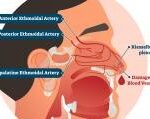Why is your puppy showering you with slobbery kisses? While it’s often a sign of affection, there’s more to puppy licking than meets the eye. This article explores the various reasons behind your puppy’s constant licking, from instinctual behaviors to potential health concerns. We’ll also discuss when licking becomes excessive and offer solutions to manage it.
Decoding Your Puppy’s Licks: Communication and Instinct
 Mother dog and puppies
Mother dog and puppies
Puppies learn to lick from their mothers. Maternal licking cleans newborns, provides comfort, and encourages essential behaviors. This instinct carries over into their interactions with humans. Licking is a primary way puppies communicate and explore their world. Since we often use our hands to pet them, a lick is their way of reciprocating the greeting. Just like barking, licking serves as a vocalization, conveying messages they can’t express with words.
Reasons Behind the Puppy Kisses: Affection, Taste, and More
Puppy licking often stems from:
- Seeking Attention: A lick can be a plea for playtime, food, or a potty break.
- Enjoying Your Flavor: Salty skin, lingering food particles, or even lotions can make you taste delicious to your puppy. They also use licking to gather information about where you’ve been and what you’ve been doing.
- Playful Interaction: Licking can be a gentler form of play compared to biting.
- Grooming and Hygiene: Dogs instinctively groom themselves and their loved ones.
- Showing Empathy: Research suggests dogs lick and nuzzle to comfort distressed humans.
- Wound Healing: Dog saliva contains enzymes that promote healing. However, excessive licking can reopen wounds.
When Licking Becomes a Problem: Identifying Excessive Behavior
While licking is normal, it can become excessive. While every owner has a different tolerance, constant licking can indicate underlying issues:
- Anxiety: Changes in routine or environment can trigger anxious licking.
- Allergies: Licking can be a symptom of environmental or food allergies.
- Injury or Pain: Arthritis or injuries can cause localized licking.
- Boredom: Lack of stimulation can lead to compulsive licking.
- Obsessive-Compulsive Disorder: Prolonged stress can develop into OCD, manifested as excessive licking, sometimes leading to sores or hair loss.
Managing Excessive Licking: Training and Veterinary Care
Addressing excessive licking involves:
- Negative Reinforcement: Withdraw attention when your puppy licks excessively. This teaches them that licking doesn’t achieve the desired outcome.
- Distraction: Redirect their focus with toys, games, or walks.
- Addressing Underlying Issues: Consider potential allergens, anxieties, or medical conditions. Consult your vet for diagnosis and treatment.
- Positive Reinforcement: Reward desired behaviors with praise and affection.
- Consistency: Maintain a consistent approach to training and management.
If excessive licking persists or involves self-licking in one area, consult a veterinarian. It could signal an underlying health problem requiring professional attention.
Conclusion: Enjoy the Puppy Love, But Monitor the Licks
Puppy licking is a natural and often endearing behavior. However, understanding the reasons behind it and recognizing when it becomes problematic is crucial. By managing excessive licking and addressing any underlying issues, you can ensure a happy and healthy relationship with your furry friend. If you are concerned about your puppy’s licking behavior, don’t hesitate to contact your veterinarian. They can provide guidance and rule out any medical concerns.
